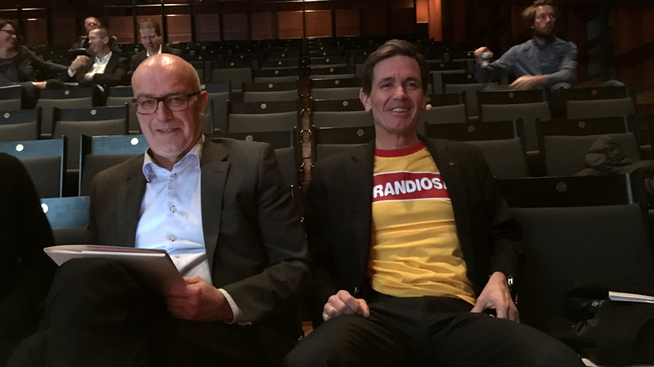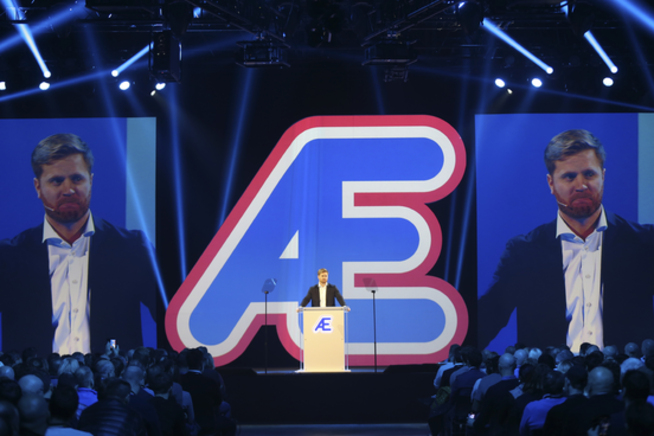We are keen to be friend with everyone, and like best friends with everyone. But I don’t like the term best friend. We are going to sell the goods where the consumer expects to find our goods, in all channels and to all customers, ” says ceo Peter Ruzicka of the River to the E24.
We have major brands like all norwegians want, and then we shall be present everywhere, either we are best friend, or just friend, or even uvenn.
He let Thursday until Orklas earnings for the fourth quarter, and in the connection used E24 opportunity to ask him about leverandørkjempens thoughts around the recent upheavals in the dagligvarebransjen.
This does not include at least the Rema “Æ”campaign and the chain’s focus on “best friends” – the main suppliers within the different categories.
It is already known that the River is affected by this, among other things by the fact that the Kims get significantly less shelf space at Retail. But at the same time can, for example, the River-the product of Nora jam get a surge of that Rema sends Lerum out in the cold.
Customizations
Ruzicka is not awfully talkative about the subject. But he confirms that they sign it that is happening in the industry, and that they need to relate to and adapt to the current dynamics with your customers.
– Some categories are up and some are down. For example, we lose the “listing” at Kims snacks at Rema. Where are we looking, except for a few goods, which ostepop. So some have done well and some have not done well, ” says Orkla boss when syltetøyeffekten going on the path.
Dagligvareekspert believes that Rema has missed with Æ: – Has been the loser
– do you Have estimates of the net effect of this?
– No.
One can see for themselves that the Rema-arrangements will give suppliers the incentive to expand the breadth of the categories to which they actually are “best friends”.
– Yes, but this is not something new. There it is in negotiations every year. You can get a good cooperation with a chain on a category and then a larger width where, but perhaps less on something else. That’s it, ” says Ruzicka.
Positive trendbrudd
the River-boss-held, national, today’s resultatpresentasjon wearing a Grandiosa-shirt.
last year bought the Norwegian Grandiosa for over one billion dollars, and the incredibly popular pizza is one of Orklas’s strongest brands. This is thus one of the company’s foremost aces in the sleeve:
One should not so very far back in time in order to find clear evidence that the norwegians opt out of unknown, but cheaper, brands for the benefit of the familiar favorites.
Ruzicka is also not worried about any increase in the focus on the chains ‘ own brands.
– our Own brand has grown steadily throughout the years, but we do not see any increased growth within their own brands – maybe on the contrary. It has actually begun to flatten out. Norway is at a lower level when it comes to own brands than in Europe in total, but in fact it was 2015 for the first time ever that a private merkevareandel in Europe went down, ” he says.

CREATED LAUGHTER IN the AUDIENCE: Peter Ruzicka usually places forth Orklas results in a suit and tie. Today was the outfit a different, in conjunction with that 2016 was the Pizza Grandiosa a year.
He says that the share of own brands in the european market for the first time fell in 2015. After a steady growth to around 32 per cent, decreased the proportion with a barely percentage points.
– If there is a trend that continues, we think it’s brilliant, ” he smiles.
Tough negotiations
the Rema “Æ”campaign, where they give ten percent discount on fruit and vegetables, as well as ten percent on the ten items customers buy the most, was immediately met by the offer also in the other chains.
Goes out of their margins when the chains using the price against one another?
It is also not something new for us. We have to harsh, but constructive negotiations with the grocery chains in all the countries we operate in. It is not something new, it has been tough negotiations all the way, ” says Ruzicka.
He goes on to say that there is no “dramatic change” in how they assess private sales potential from year to year.
– We are used to tough negotiations, that there are tough requirements from the customers. The competition between the customers also bends in intensity – we have seen a share price wars the last six years, now it is fruit and vegetables. I will say it is a normal situation.
- Share on Facebook
- Share on LinkedIn
Share on Twitter

No comments:
Post a Comment